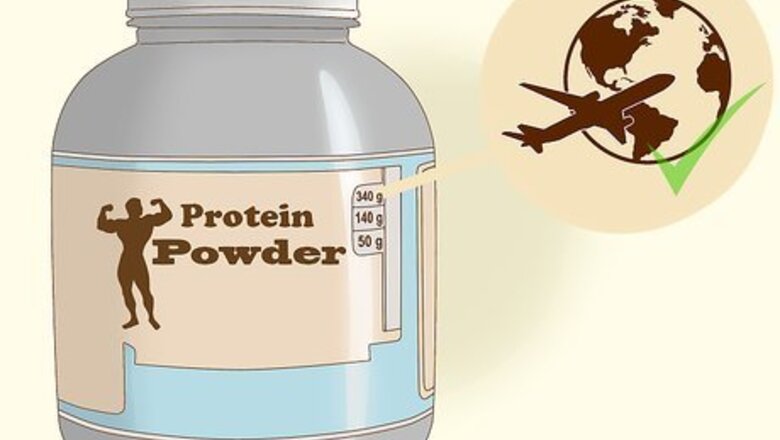
views
Packing Powder Supplements
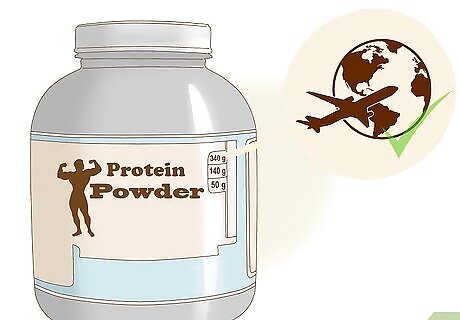
Look up the weight restrictions for powders where you’re travelling. It’s not illegal to fly with powder supplements, so you don’t need to worry about getting in trouble or anything. However, you will be held to strict weight limits for your powdered supplements depending on where you’re going. If you’re flying domestically, look up the restrictions in your country online. If you’re flying internationally, be sure to check the weight limits for powders in both countries before packing. You can typically find weight restrictions for flying in or to a country by typing the country’s name into a search engine followed by “powder” and “flying.” You will also be able to find a country’s flight restrictions on their government’s aviation website. If you’re flying domestically in the United States, you are restricted to 12 ounces (340 g) of powdered materials.
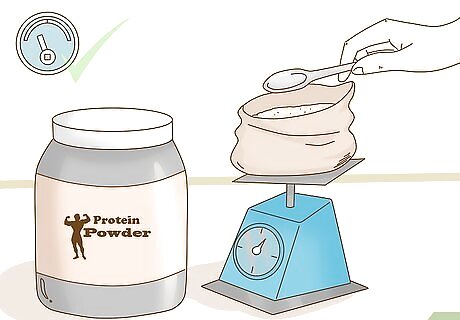
Weigh out how much powder you need without exceeding any limits. Set a cup on top of a scale and reset it with the cup on top so that the measurement reads 0. Then, scoop out the amount of powder that you believe you’ll need. Leave a little bit of breathing room for the scooper if you plan on bringing it with you.Tip: The scoops that come with protein powders typically weigh out 0.4–0.6 ounces (11–17 g) of powder. If you don’t have a scale, you can estimate the amount you need using the scooper. Most airports don’t weigh powders unless it looks like you’re carrying too much anyway, so you may not be penalized for going a little over the limit.
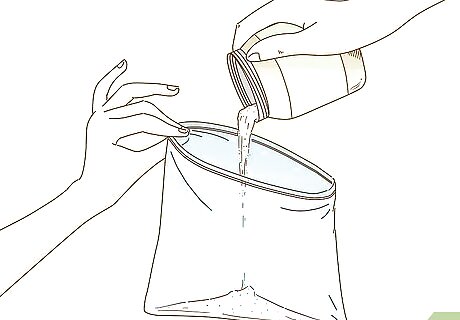
Pour your powder into an airtight plastic food storage bag. You may be stopped for screening if the bag isn’t transparent, so make sure that you use a clear plastic bag. Open the top of the bag and carefully pour your powder inside. Once your bag is full, press the air out as best as you can and close the zipper at the top. Place your scooper inside of the bag if you’re bringing it along with you. The scooper doesn’t weigh very much and can make it easier to regulate how much powder you’re using, so most people choose to bring it with them when they travel.
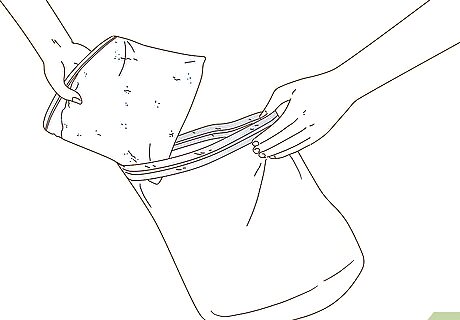
Put the bag inside of a second, larger bag to avoid spills. Take your powder-filled bag and set it inside of a larger bag. Orient the bags so that the zipper on the smaller bag is on the opposite side of the zipper on the larger bag. This way, if the bags get squeezed or break while you’re traveling, the powder won’t blow all over the place. Seal your second bag after pushing the air out. You can add a third or fourth bag if you’re really worried about spills or you are carrying electronics that may be damaged by powders.
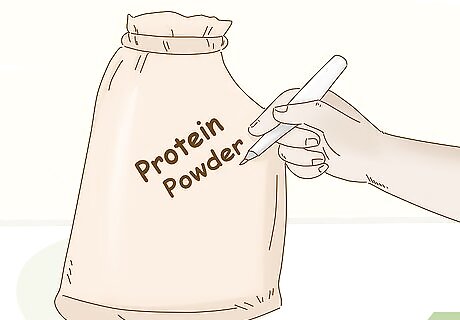
Label the bag with a permanent marker to keep things easy for security. While an unlabeled bag of powder may raise some eyebrows, a bag labelled “protein powder” is likely to put the security officer at ease if they inspect it. This is also a crucial step if you’re packing multiple powders for different workout routines. Write the name of the powder or a short description in obvious, large, black letters with a permanent marker. Whether you’re checking or carrying your powder on to the plane, the powder may be checked by security. It’s not illegal or against the rules to bring powders, though. If questioned, simply explain what the powder is. If you’re asked to discard it, don’t argue. Keep your powders in your carry-on bag to keep an eye on the powder and make sure the bag won’t open on accident. If you aren’t worried about spills though, go ahead and throw it in a checked bag.
Flying with Pills and Vitamins

Look up the rules about pills and vitamins where you’re travelling. Most countries allow you to bring a 30-day supply of pills. However, some countries have restrictions on certain nutritional supplements and many countries with strict narcotic laws will give you hard time about loose capsules. Contact the foreign embassy of any international country to see if specific vitamins or pills are allowed and look online to see if there are hard restrictions on the number of pills you can bring. For example, if you’re flying to Mexico from Canada, contact the Mexican embassy in Canada to inquire whether certain vitamins or pills are allowed. With rare exception, you can travel with an unlimited number of pills. Keep in mind, if you bring more than 1-2 containers you may get stopped or questioned about why you’re travelling with so many pills.
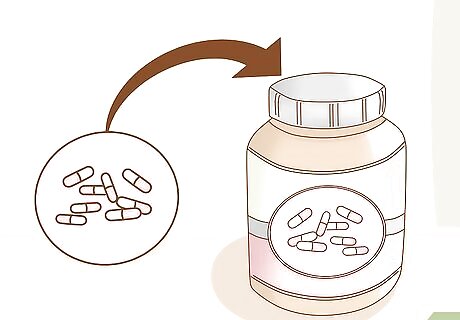
Keep your pills and vitamins in their original containers if possible. While supplement pills aren’t typically required to be in their original containers, you’re less likely to run into problems with security if the pills are in the container they were sold in. Get a fresh bottle of your supplements and keep the seal on if you can.
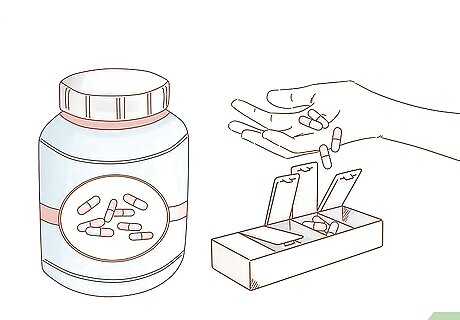
Put your pills in a pill organizer or labelled bottle to take a smaller amount. If you aren’t travelling with a full bottle of pills, get a pill organizer. Put 1-3 pills in each individual compartment to ensure you have enough for each day that you’re gone. Alternatively, you can count out the pills and put them into a small plastic pill container. If you do this, write the name of the pills that you’re bringing on the bottle in black permanent marker.Tip: You’re less likely to run into problems with security if your pills are in an organizer. The pills will be fine in a labelled pill container if you don’t have an organizer, but you’re more likely to be asked about them if you do this.
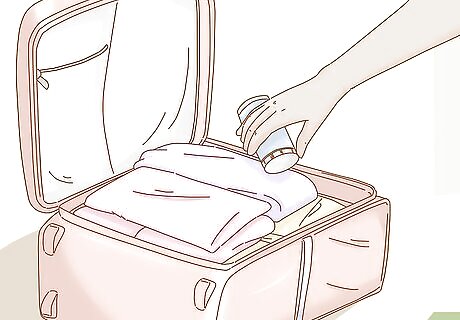
Pack your pills in a bag that you’re checking to make travel easier. To make airport security easier, put the pills in a bag in check it. This way, you won’t need to worry about getting stopped at the security checkpoints at the airport. In addition, you won’t need the pills while you’re flying and there isn’t any risk that the pills will break in a checked bag. If you’re travelling with medications, keep them in your carry-on bag. This way you’ll still have access to them if your bag gets lost. The supplements aren’t as important as medication though, so it’s better to check them for security reasons.
Travelling Smart and Packing Liquids

Buy any supplements you’ll need once you arrive at your destination. If you’re travelling for more than 6-7 days and your supplements aren’t particularly hard to find, simply buy what you need when you arrive. Look online to find a vitamin store near where you’ll be staying and contact them ahead of time to ensure that they carry what you’ll need. This way, you won’t need to worry about packing any supplements.
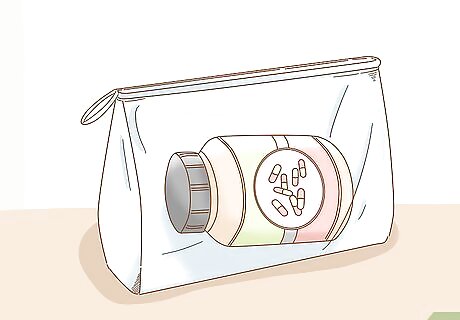
Purchase travel-sized pouches of any powders you want to bring. Many supplement companies make travel-sized versions of their products to make air travel easier. Contact your supplement manufacturer or look online to see if there is a comparable product on the market. Purchase a few of these pouches and take them with you instead of packing your powders in a plastic bag to make things easier.Tip: These travel-sized pouches are typically not flagged by security or inspected. This can save you a lot of trouble if you’re worried about getting stopped at the security gate.
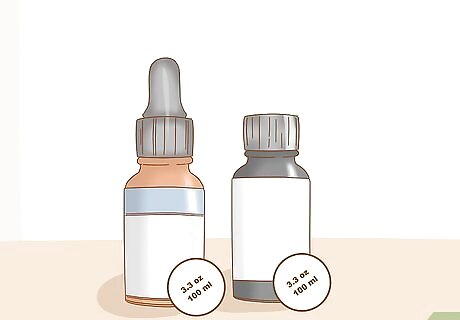
Keep liquid supplements under 3.3 ounces (100 mL) and in original packaging. If you have any liquid supplements or essential oils that you want to bring, make sure that the container contains less than 3.3 ounces (100 mL) to ensure that you don’t need to throw them out. Keep the liquids in the original containers to avoid issues while you’re travelling. The restrictions on liquids differ from country to country, but 3.3 ounces (100 mL) is pretty common internationally. Many countries allow you to keep liquids in unlabeled containers, but it’s a good idea to keep liquid supplements in their original containers since they aren’t easily identifiable on their own.




















Comments
0 comment